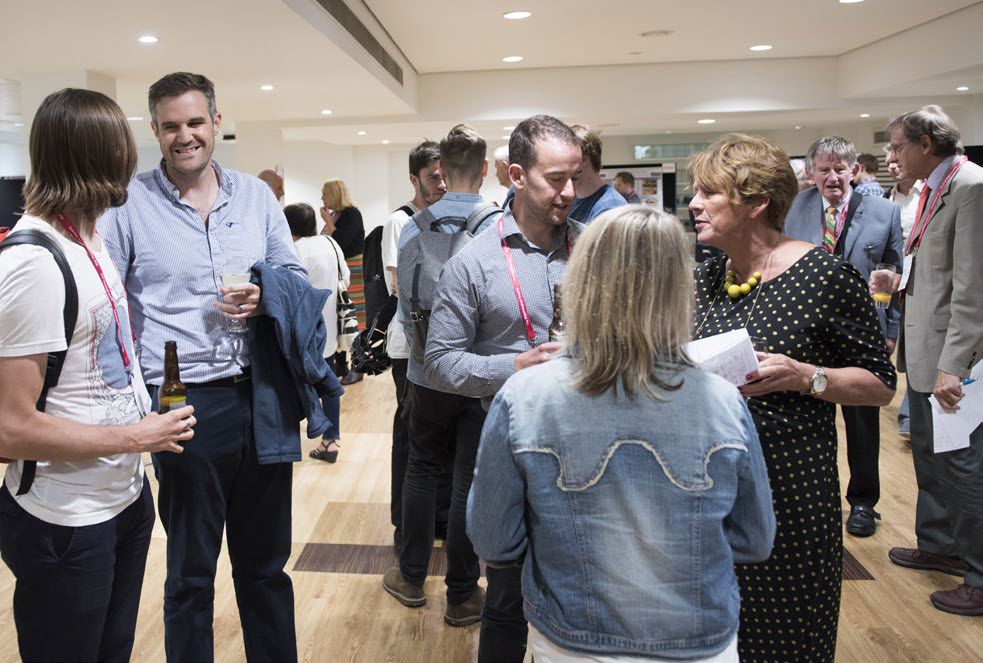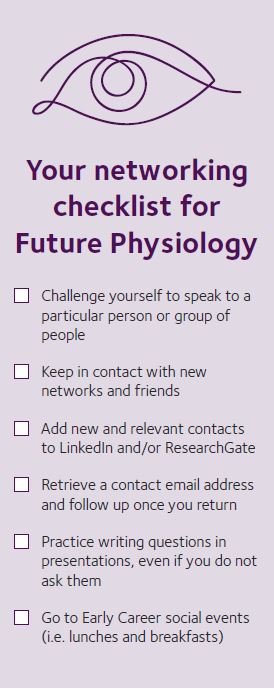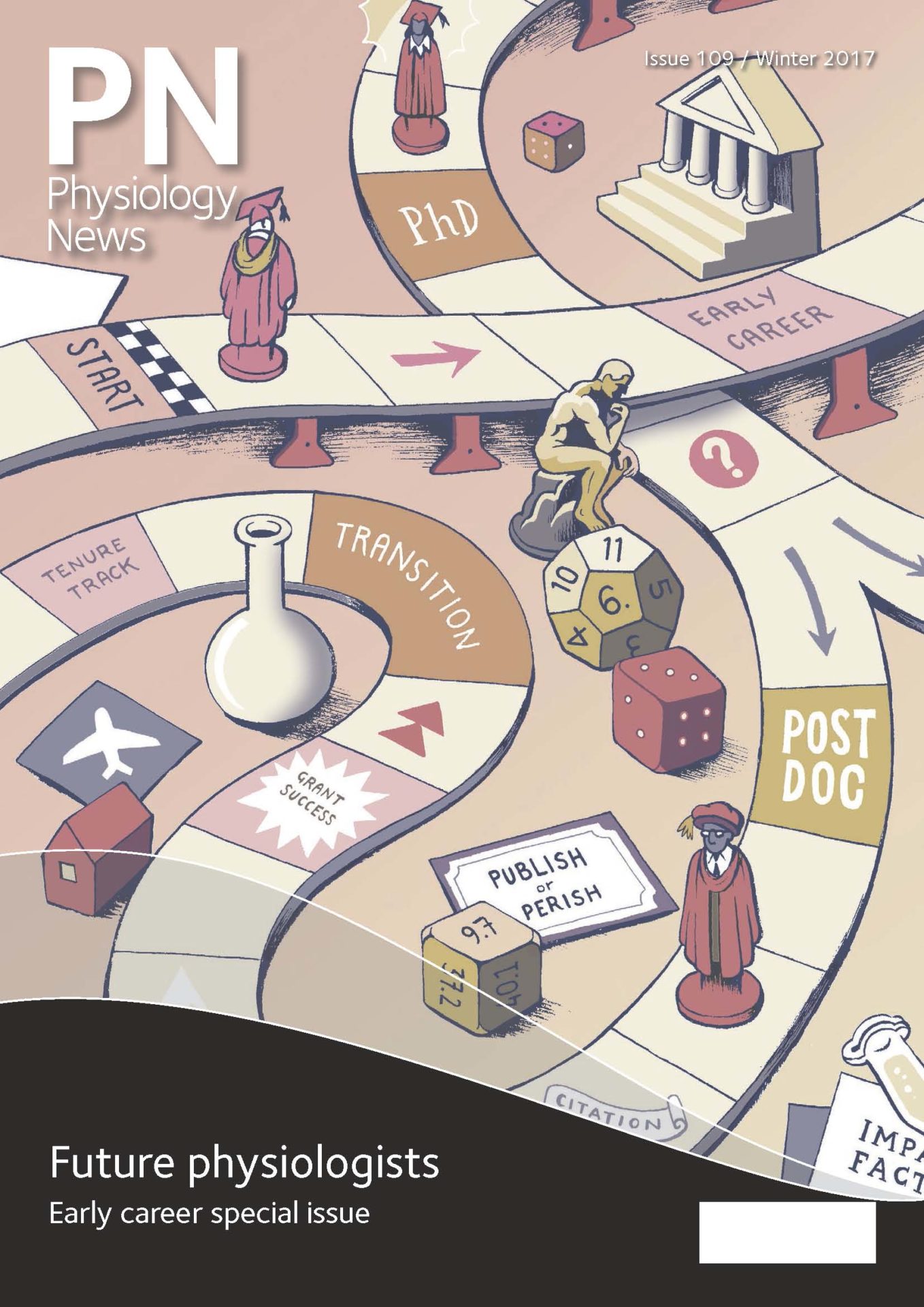
Physiology News Magazine
Future Physiology 2017: ignite your networking at conferences
Events
Future Physiology 2017: ignite your networking at conferences
Events
Hannah Marie Kirton
Faculty of Biological Sciences, University of Leeds, UK

https://doi.org/10.36866/pn.109.18
13–14 December 2017, University of Leeds,
Leeds, UK
www.physoc.org/futurephysiology/

We hear it all the time: networking, networking, networking is so important for us. It’s true! Never underestimate the power of networking. However, for some of us, it’s not that easy. Do you find it daunting? Difficult to initiate? Or do you just need a motivational boost to start building new and existing relationships? Amidst the inhibitions to just get out there and network, it’s important to realise the true potential of networking and how it impacts career success. In this article, I have compiled a ‘Mini Journal’ of networking tips and advice, but more importantly, explain its importance.
What is networking?
Networking is an interaction that exchanges information and ideas, in order to develop productive and professional relationships. Networking is best, and easiest, at conferences and meetings, where there are a multitude of professionals in and related to your field of interest. But remember, networking is not just about speaking with key leaders in your field. It’s also just as important to talk and network with PhD students, postdocs and other early career researchers. If anything, forming new contacts with early career researchers is more beneficial, since you will grow together in your field and may regularly contact each other throughout. Plus, they are a direct contact to the group leaders who you may be interested in working with and therefore, a good way to understand how that lab or institute works and supports early career researchers.
Why is networking important?
Put simply, networking with PhD students, postdocs and group leaders can benefit both your research and recognition, which, if performed correctly, will boost your career.
• Research
Communicating with researchers and experts in your field can open up new questions and ideas for your research. This will enable you to view your research from a different point of view, both technically and theoretically. Collectively, this helps to shape and strengthen your research. This also forms the basis of collaborations, which generates a multidisciplinary approach to research and facilitates publications in high-impact journals.
• Recognition
Networking is also an excellent platform to increase visibility within your research field, and visibility to prospective future employers. It also enables you to communicate with PhDs and postdocs you may later work with, who are equally key to your future.
How to network?
Try to break away from your comfort zone at conferences and meetings. It is so easy to stick to your lab team and supervisor, but remember, you have already formed professional relationships with them and see them every day! Challenge yourself. Be curious and open your mind.
Beginners top tips
- If networking is not your strongpoint, start by speaking to early career researchers in your field. Attend early career breakout meetings such as the postgrad, postdoc breakfasts and career sessions, and talk to the people around you, i.e. talk about their poster and research, or even their career. It’s amazing how quickly people let their guard down once you talk about or compliment their research.
- Attend poster sessions. These are generally more informal and relaxed, helping you to ask your question and engage in conversation over research.
- Add your e-mail address to your posters, this will help people to get in touch with you. Remember, you are not the only one networking.
- Simple ways to interact with researchers at conferences can include striking a friendly conversation at a dinner or coffee queue or sitting next to someone at lunch. This is an easy way to build your confidence and get used to introducing yourself at conferences.
- Alternatively, utilising a familiar point of reference helps to build relationships, i.e. mentioning a work colleague you both know.
- If you’re not ready to ask a question at the end of oral presentations, approach the presenter after the session. Be confident, but think carefully about your question!
Advanced top tips
- If you aim to speak with team leaders in your field and don’t quite have the courage to walk over and introduce yourself, look out for them at the conference reception or dinner. An easy icebreaker is to smile, introduce yourself, and talk about your lab and research. Try to follow that up with an easy question about their research, or yours!
- Be specific when you approach people. If you admire their work then demonstrate it, by saying something like: ‘I really enjoyed your recent paper in Neuron about sodium channels’.
- If there is a particular person you would like to speak with, email them a few days before the conference and let them know you’d like to meet up. This cuts out any awkward introductions, and forces you to follow your plans to meet.
- Alternatively, plan ahead prior to a conference or meeting. Read about their research and publications before approaching them with your questions. This will help you articulate questions specifically, clearly and with confidence.
- Once you have developed a network, make a strong effort to maintain that link. Promptly reply to emails or make regular contact when possible. It is very hard to make connections, but very easy to lose them.
Future Physiology 2017
At this year’s Future Physiology conference, I have a ‘Future Physiology Postcard’ stand, where I invite you to write a ‘future’ task for yourself. Encourage yourself to talk to a particular professor or leading researcher in your field, improve your networking ability, or set a particular goal that could impact your career or research. I will post these to you, as a little reminder of your goal, aspiration or task to fulfil in 2018.

